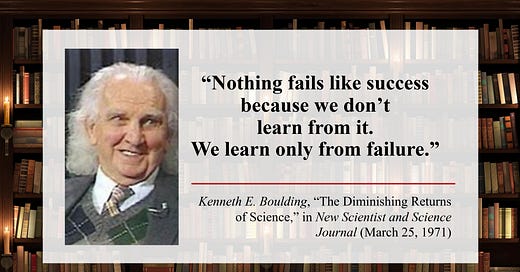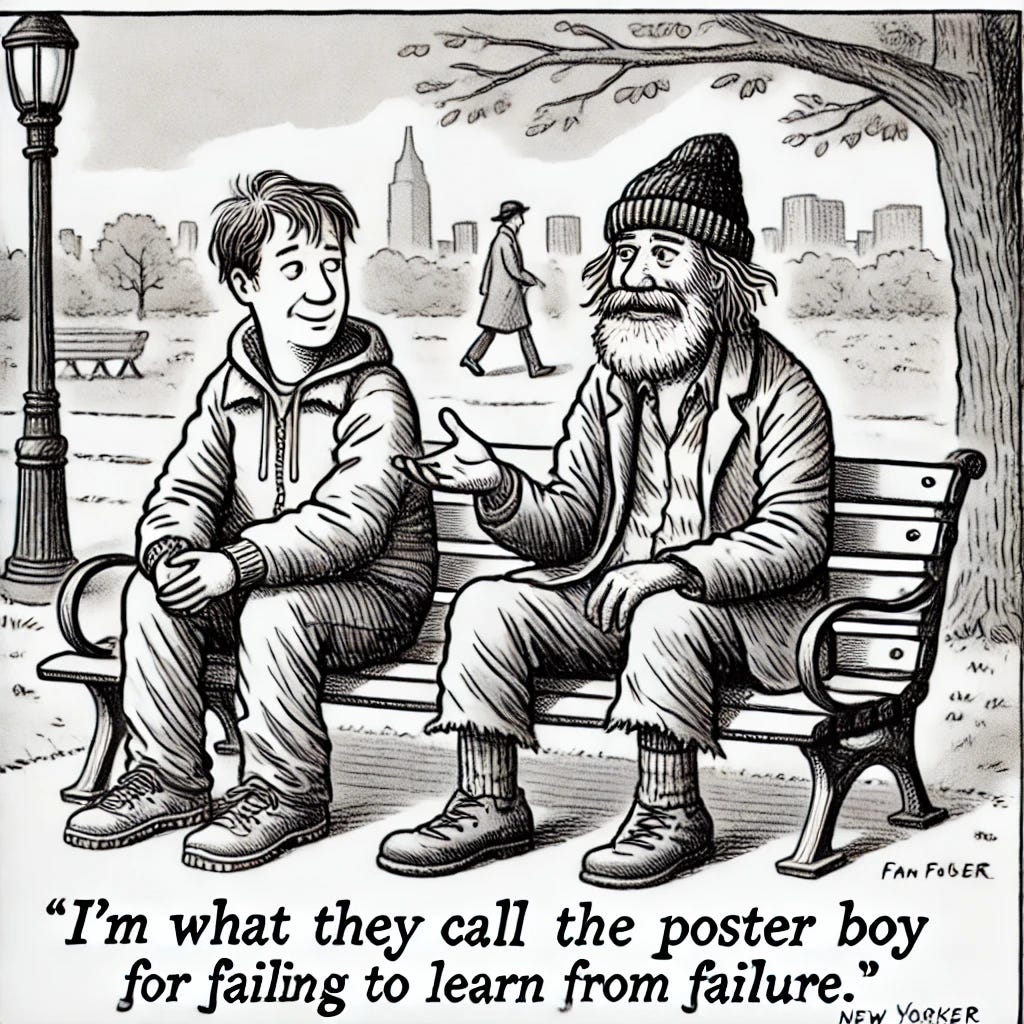Dr. Mardy's Quotes of the Week ("Learning From Failure")
Nov. 10—16, 2024 | THIS WEEK'S THEME: “Learning From Failure"
The Voters Have Spoken!
The election is over and we have witnessed a dramatic victory by Donald Trump and the Republican Party. I thought it was going to be a close election, but it was not, and the former president pulled off one of the most amazing comebacks in political history. He even managed to do what was previously considered unthinkable, sweeping the so-called “impregnable Blue Wall” of Wisconsin, Michigan, and Pennsylvania. In the grand American tradition, I believe in the peaceful transition of power and therefore accept the results of the election.
However, it is also possible to view what happened this week as a historic failure on the part of the Democratic Party. More on this later.
Quote of the Week
Why is it that people learn so much more from failure than success? In large part, it’s the flip side of that popular definition of insanity: doing the same thing over and over again and expecting a different result.
When we succeed, it seems only natural to continue to operate in the same manner. But what do we learn in the process? Not much. But if we fail, and continue to do the same things, it’s not only nonsensical, but a little crazy.
This Week’s Puzzler
On August 24, 1947, this man was born in Rio de Janeiro, Brazil. Growing up, he was a rebellious teenager who so troubled his parents that they had him committed to a psychiatric hospital that specialized in shock treatments. Later in life, he forgave his parents, saying, “They did not do that to destroy me, they did that to save me.”
At age 20, he attended law school for a year before dropping out and living a hippie lifestyle that took him all around the world. Returning to Brazil in the early 1970s, he embarked on a career as a songwriter, blending rock music with elements of traditional Brazilian culture. Many of his songs were considered subversive by the country’s right-wing military regime, and he was briefly imprisoned several times.
After publishing two forgettable books in the early 1980s, he had what he described as a “spiritual awakening” while on a pilgrimage to the shrine at Santiago de Composele in northern Spain. He eventually described the experience in O Diário de Um Mago (“Diary of a Magus”), a 1987 novel that went on to become an international bestseller under the title The Pilgrimage.
It was his next book, though, that would ensure his place in literary history, selling more than 150 million copies worldwide, and making him one of the most successful authors of all time. The Alchemist (1988) was the story of an Andalusian shepherd boy who embarked on a journey to Egypt in pursuit of a recurring dream about discovering treasure near the pyramids.
He went on publish nearly thirty more books, and is still going strong at age 77. In a 2010 FaceBook post, he wrote:
Who is this person? (Answer below)
Will the Democrats Learn from Their Recent Failure?
NOTE TO SUBSCRIBERS: While my newsletter is primarily about words, language, and quotations—and the pivotal role they play in our lives—I occasionally make a foray into the larger social and political arena. When I do, my remarks are intended to be analytical rather than partisan.
What Happened in the Election?
In the 2024 election, almost all of the pollsters, analysts, and pundits were predicting a razor-thin contest. In the days before the election, though, observers from all over the political spectrum faulted the Trump campaign for veering markedly “off-message,” with most citing the vile Puerto Rico joke at the Madison Square Garden rally. Those same analysts also pinpointed a number of missteps in the Harris campaign—like her surprisingly bad answer to a softball question on The View—but they generally marveled over what the Vice President had accomplished in a remarkably short period of time.
In my case, I expected a “squeaker,” with Harris pulling off a late victory. What I never expected—and I suspect this was true for you as well—was a stunning win for the GOP. The day after the election, The Financial Times reported that 48 of the 50 states showed a distinctly rightward turn, in many cases dramatically. It was a remarkable Trump victory that could accurately be described as “historic.”
As I suggested earlier, though, it’s also possible to view what happened as a failure of epic proportions on the part of the Democratic Party. And, if that is true, the big question moving forward is, “Will the Dems learn from their recent failure?”
When people fail miserably, it often results in a personal crisis that is so severe they decide to seek professional help. So today, let’s imagine a hypothetical scenario in which the Democratic Party is a person who has sought counseling. What will happen in that first session?
After the client has laid out “the presenting problem,” the shrink will likely say something along the lines of, “Our job here will be to figure out what went wrong, what you can learn from the experience, and what you need to change going forward.” Beyond that, what else can we expect to see unfold in that first session?
A Stinging Defeat Presents a Rare Opportunity
In many ways, psychologists prefer to see clients in a crisis because they know that people don’t make changes when things are going well. A crisis forces people to heed things that, during normal times, they choose to ignore. And when a crisis gets people to respond by abandoning outworn assumptions and changing maladaptive patterns, it increases—often dramatically—the odds of achieving success in the future. So, in that first session, I wouldn’t be surprised to see the therapist offering one of these observations:
Don’t Waste Your Time Asking “What If” Questions
In a first counseling session, it’s also common for helpers to remind clients to avoid the temptation to ask questions about hypothetical scenarios. In the case of the recent election, countless examples come to mind, including: “What if Attorney General Garland had appointed a Special Prosecutor shortly after the January 6th insurrection instead of two years later?” Or, “What if President Biden decided to step down after one term?” Or, “What if Kamala Harris had agreed to an interview with Joe Rogan?” Or, “What if Taylor Swift supported Harris in the same robust way Elon Musk did with Trump?”
Questions like these—no matter how intriguing—are problematic because they create the illusion that people are analyzing the problem when they’re only engaging in fanciful thinking. To make progress in life, it is essential that people deal with what actually happened, not on what might have been—and when they focus on “What if” questions they’re not focusing their attention on the problem that needs to be solved.
Don’t Play “The Blame Game”
Ever since the phrase “The Blame Game” entered the world of popular discourse in the 1950s, it has become the most popular term to describe what is happening when people blame someone—or something—else rather than take personal responsibility for their problems.
In conversations with my Democratic friends after the election, the vast majority have had three key scapegoats: (1) President Biden for deciding to seek a second term; (2) the post-COVID economic situation—with its high inflation—that has been making it difficult for incumbent politicians the world over; and (3) the intelligence—or lack thereof—of many American voters. Still others have identified the traditional problems of racism, sexism, and misogyny.
In our hypothetical counseling scenario, if the client started to mention any one of these, the therapist would almost certainly say something like: “While all of these almost certainly played a role in the outcome, citing one of them as the chief culprit or key factor is simply a way of avoiding responsibility for the problems that brought you to counseling in the first place.”
What Else Will Future Counseling Sessions Focus on?
In the hypothetical example of my new client, we’ve only had our first session, so I can’t predict with certainty the core issues that will emerge in future sessions. But let me highlight a few that will likely emerge.
The working class has been the backbone of the Democratic Party since the 1930s, but they’ve been drifting away from the party for years—and in this election, they did so dramatically. And, while party leaders still view themselves as the party of the working class, large swaths of that group appear to be in solid agreement with Ronald Reagan, who once famously quipped, “I didn’t leave the Democratic Party, the Democratic Party left me.” Something very similar also applies to the immigrant community, especially Latinos.
Another issue, I think, will center around how the Democratic Party communicates it core ideas to the American public. This commonly falls under the rubric of “Messaging” in political circles, and it is commonly expressed by the admonition, “Meet the people where they are, and speak to them in language they can easily understand.”
To cite only one example, by the summer of 2024, it was clear that the Biden administration had outperformed every country in the world in its post-COVID recovery efforts. Indeed, a month before the election, The Economist, a conservative publication, even touted the American economy as “The Envy of the World.” On the stump, though, messages about the achievement were not well received by working class and young voters. With them, focus groups revealed that many viewed the party as being completely unaware of how much they were struggling in their daily lives.
In almost all counseling efforts, the concept of self-deception comes up, and I suspect that will also be the case here. Simply stated, self-deception is fooling ourselves with self-flattering illusions. The cure, as the Scottish poet Robert Burns suggested centuries ago, is “to see ourselves as others see us.” And the sad truth is that too many American voters—especially voters the Democratic Party needs to win over—view the party as primarily comprised of elitists who not only look down on them, but are giving priority to other groups and to priorities that are very different from their own.
Let me bring my remarks to a close by mentioning one other issue that will likely come up. It is well expressed by the old maxim, “Never let your enemies define you,” and it captures something the right-wing media have been doing for decades. It first occurred with the infamous Willie Horton ad against Mike Dukakis in the 1988 presidential election, and we saw an even more loathsome example this year in the political ad about Kamala Harris supporting taxpayer-funded sex-change surgery for transgender prison inmates. Over 100 million dollars were spent on that single ad, and it was so vile that voters were reluctant to mention it, political commentators reluctant to discuss it, and the Democratic candidate and her surrogates appearing reluctant to forcefully challenge it. And so the ad continued to be broadcast, infecting the minds of millions and millions of viewers.
I could go on, but I’ve already gone on longer than I originally anticipated. I look forward to your reactions in this week’s “Comments” section.
This week, also take a few moments to think about your own failures, and how much you’ve learned from them. Below, I’ve assembled a number of quotations on this important theme in human life:
Failure is feedback. — Author Unknown, but popularized by Billie Jean King
In archery we have something like the way of the superior man. When the archer misses the center of the target, he turns round and seeks for the cause of his failure in himself. — Confucius
Failure is not mere failure. It is instructive. The person who really thinks learns quite as much from his failures as from his successes. — John Dewey
Failure is just another way to learn how to do something right. Marian Wright Edelman
He who has never failed somewhere, that man cannot be great. Failure is the true test of greatness.— Herman Melville
Failure is nothing but success trying to be born in a bigger way. Most seeming failures are just installments toward victory! — Catherine Ponder
We go forward by failure. Every blunder behind us is giving a cheer for us and only those who are willing to fail shall taste the dangers and splendors of life. — Carl Sandburg
Good people are good because they’ve come to wisdom through failure. — William Saroyan
It has been said that failure should be our teacher, not our undertaker. — Denis Waitley
Failure is not fatal but failure to change might be. — John Wooden
For more quotations on the theme of LEARNING FROM FAILURE, go here.
Cartoon of the Week:
Answer to This Week’s Puzzler:
Paulo Coelho
Dr. Mardy’s Observation of the Week:
Thanks for joining me again this week. See you next Sunday morning, when the theme will be “Stupidity”
Mardy Grothe
Websites: www.drmardy.com and www.GreatOpeningLines.com
Regarding My Lifelong Love of Quotations: A Personal Note











I think the larger reason for the election and Trumps victory is that he appealed strongly to the emotions. He demonstrated that the passions can Trap logic or rational thinking and he could not have done it without the help of the internet, social media, all media which allowed him to get into the heads of millions of people many times a day over many years, all the while repeating the lies. Right out of Hitlers playbook.
Living in South Dakota, we have already been advised that Governor Kristi Noem will again request fireworks over Mount Rushmore on the 4th of July. The last time this was permitted, under Trump's administration, there was a significant protest by Native Americans which resulted in several criminal charges being filed against Native Americans. “That the desires of the majority of the people are often for injustice and inhumanity against the minority, is demonstrated by every page of the history of the whole world.” John Adams